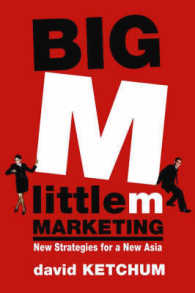- ホーム
- > 洋書
- > ドイツ書
- > Social Sciences, Jurisprudence & Economy
- > Politics, Society, Work
- > political science
Full Description
Economic systems driven by monetary interests have enabled individuals, international institutions, and governments to prioritize financial gain and budget constraints over people. This has placed global dominance above human rights. This edited volume tackles the relationship between human rights and economic systems, providing new ways to help countries prioritize human rights in their economies. It includes contributions from scholars actively involved with the UNESCO Chair in Economic Systems and Human Rights, founded at the National University of La Plata. These contributors specialize in a range of topics within different disciplines, including economics, sociology, history, geography, law, and philosophy.
Providing historical insights into past and present conditions, the contributors explore the best ways to reform modern economic systems to ensure they promote human rights. The first half of the book includes theoretical proposals and underlying themes, while the second half offers concrete models and practices for use in today's dominant economic systems. Unique contributions within chapters include frameworks readers can use to apply socioeconomic theory at both national and international levels.
The book examines structural problems such as socio-environmental crises, increased rates of inequality, and gaps between the economy and society. It discusses the transformation of dominant socio-economic theory as it relates to financial systems, productive labor markets, social participation, and the relationship between the economy, society, and the environment. Chapters directly address the loss of the ontological function in economies and propose new approaches to existing economic systems, drawing on scholars such as Adam Smith, who is well-known for his idea of the "invisible hand."
The resulting book presents a modern approach to national and international well-being built around human rights. Readers will learn about the socioeconomic models and practices that best promote economic socialization and how this relates to global values shared across economies.
Contents
Part I: Reflections and theoretical contributions.- Chapter 1: A conversation with Noam Chomsky about limits and challenges in human rights: Smith's vile maxim.- Chapter 2: An intentional approach to human rights in economy: interest societies vs value societies.- Chapter 3: Some reflection ideas from the ancient roots about the link between Creativity and Freedom for modern societies.- Chapter 4: The birth of the Human Rights debate (18th century).- Chapter 5: Formation and transformation of economic systems: the conquest of rights and its impact on women.- Chapter 6: Meso-Economics: The Proper Dimension of Institutional Emergence and Cultural Development. A conceptual frame.- Chapter 7: In defense of Human Rights: searching for a viable kind of objectivity.- Chapter 8: The limits of neoliberal paradigm in order to implement peoples' right.- Chapter 9: Unleashing the Human Development through Prescriptive Analytics based on the principle of Vasudhaiva Kutumbakam.- Part II: On socio-economic practices and models for Human Rights and economic socialization.- Chapter 10: Criteria for Transforming the Economy. Human Dignity, Respect for Nature, Harmony with Life.- Chapter 11: Human Rights in Economic and Social Realms: Exploring the Synergies between the Capability Approach of Amartya Sen and the Perspective of Original Institutional Economics.- Chapter 12: Beyond the economic growth: from the sustainability's rhetoric to the Bioeconomics' effectiveness.- Chapter 13: Making Space for Social Justice.- Chapter 14: The impact of neoliberalism on the right to education: limits and proposals.- Chapter 15: UN 2030 Agenda, ESG criteria and Human Rights: the way of the Civil Economy.- Chapter 16: A critical reflection on corporate social responsibility: between communitarian ethics and business purpose.- Chapter 17: The Institutional participation role in economics systems for Human Rights.- Chapter 18: The experience of Cooperative clubs and houses of the people in Italy as places for developing social human rights.- Chapter 19: Last 20: The other vision of the world.- Chapter 20: The impact of economic financialization on Human Rights: some concepts and new socio-economic practices in order to build a universal economic socialization.- Chapter 21: Sustainability Reports and Latin America: The Challenges of Social and Environmental Balances in Development Process for Human Rights.- Chapter 22: Conclusions.







